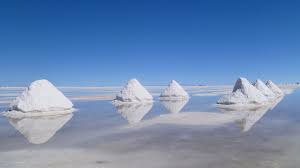Life Lessons from the Torah Portion
Parshat Vayikra Leviticus 1:1-5:26
The book of Vayikra (Leviticus) focuses on two major issues. The first is the Korbanot( the sacrifices) used in the Temple as a medium of worship and of achieving closeness with G-d. The second issue revolves around “holiness and sanctity”.
Regarding the sacrifices we are commanded a seemingly insignificant demand;
“And you shall salt every one of your meal offering sacrifices with salt, and you shall not omit the salt of your G-d’s covenant from [being placed] upon your meal offerings. You shall offer salt on all your sacrifices. Leviticus 2:13.
Echoes of that commandment has survived even the destruction of the Temple during every festive meal .When the meal begins with the ritual of blessing of bread “ the staple of life” we continue todip the bread into salt in a whisper of the salt used in the temple.
What is it about this ceremony that it has survived through the generations? Why is it that there is such emphasis on the ritual of the salt that the verses see its importance repeated three times? The verse declares that salt should be used with each sacrifice. Then we read that one should never omit the use of salt at each sacrifice and thirdly we are reminded that the salt be used on all the sacrifices.
To understand this one first must understand the concept of sacrifices( Korbanot) altogether . Is it some sort of ritual of appeasement or ritual atonement? Does the name Korbanot(sacrifices) allude to something else altogether?
Only about 12 % of the ritual of sacrifices had to with sin. The sacrifices related to sin were only applicable to sins caused by negligence. Sins that were committed purposefully could not involve sacrifice. What then did one do if one has sinned purposefully and then yearned for atonement? The only solution is to “fall on one’s face” and repent ( Teshuva).As King David writes in psalms after his own repentance” For You do not wish a sacrifice, or I should give it; You do not desire a burnt offering. The sacrifices of G-d are a broken spirit; O G-d, You will not despise a broken and crushed heart. ( Psalm 51 :18-19)
All the rest of the sacrifices were an opportunity to share a meal with G-d or to bring it as a gift to Him. Clearly G-d does not need a gift and He does not share the meal, yet mortals need a ritual or ceremony wherein they feel that can exhibit thankfulness anbd relationship. That is the root of the word Korban( coming close -Karov).
That being so , why was salt so critical to the ritual.?
The Sefer HaChinuch explains that just as the salt preserves the sacrifice, our prayer is that we remain preserved under Hashem’s [protection. Just as importantly salt makes the meat or grain offering more tasteful. It makes the gift more worthy of being brought. The salt or the more tasteful offering makes no impact on Hashem but we are moved to bring to Hashem our best.
Salt is also permanent. Yet in its permanence it can enhance and bring to life all that it comes in contact with. Yet at the same time this same salt can be harmful, detrimental and even deadly ( the Dead sea). Since the sacrifices are simply a symbol of our relationship with the Divine we must remember that that relationship is permanent. Also that it is a relationship that brings vitality, taste and meaning to our lives. Yet at the same time if we, the vessels of that relationship make ourselves unworthy the relationship itself can become difficult and fraught with consequences.
Yet it is Rashi that points to another even deeper dimension of the “salt ritual” that is presented by the midrash in the book of Genesis.
Rashi writes regarding the words; “the salt of [your G-d’s] covenant”;
for there was a covenant made with salt since the six days of Creation, in that the lower waters were promised that they would be offered on the altar. [And how were they offered? In the form of] salt [which comes from water,] and in the water libations on the Festival [of Succoth].
The Midrash in the first chapter of Genesis describes a metaphorical crisis around the separation of the Waters on the third day of Creation.
” And G-d made the expanse and it separated between the water that was below the expanse and the water that was above the expanse, and it was so.”( Genesis 1:7)
The Midrash explains why the third day does not end with the words” and it was good”. The separation of the waters caused great “sadness” and consternation” amidst the “Lower” waters who were suddenly disconnected form the “Heavenly “waters. G-d comforts them by describing the “Water libation” ceremony on the Feast of Tabernacles wherein waters are brought and raised up on the altar. The Midrash goes on to explain that the lower waters were still immersed in sadness so Hashem reminds them that the salt which is the residue after the water of the sea after evaporation will be a constant reminder on every sacrifice.
The lower waters are termed the “weeping waters” because of their intense yearning to be reconnected with the heavenly waters again . That yearning is an eternal powerful spiritual force. Over 60 to 75% of our human bodies are made up of that same Yearning and Weeping waters. The majority of our physical body is empowered by that yearning.
The salting ritual continues to be performed throughout the generations of our tradition
That is due to its connection to yearning and hope. It represents every moment of sincere yearning and dreams.
That salt on the altar represents every one of our tears ,
LeRefuat Yehudit bat Golda Yocheved

